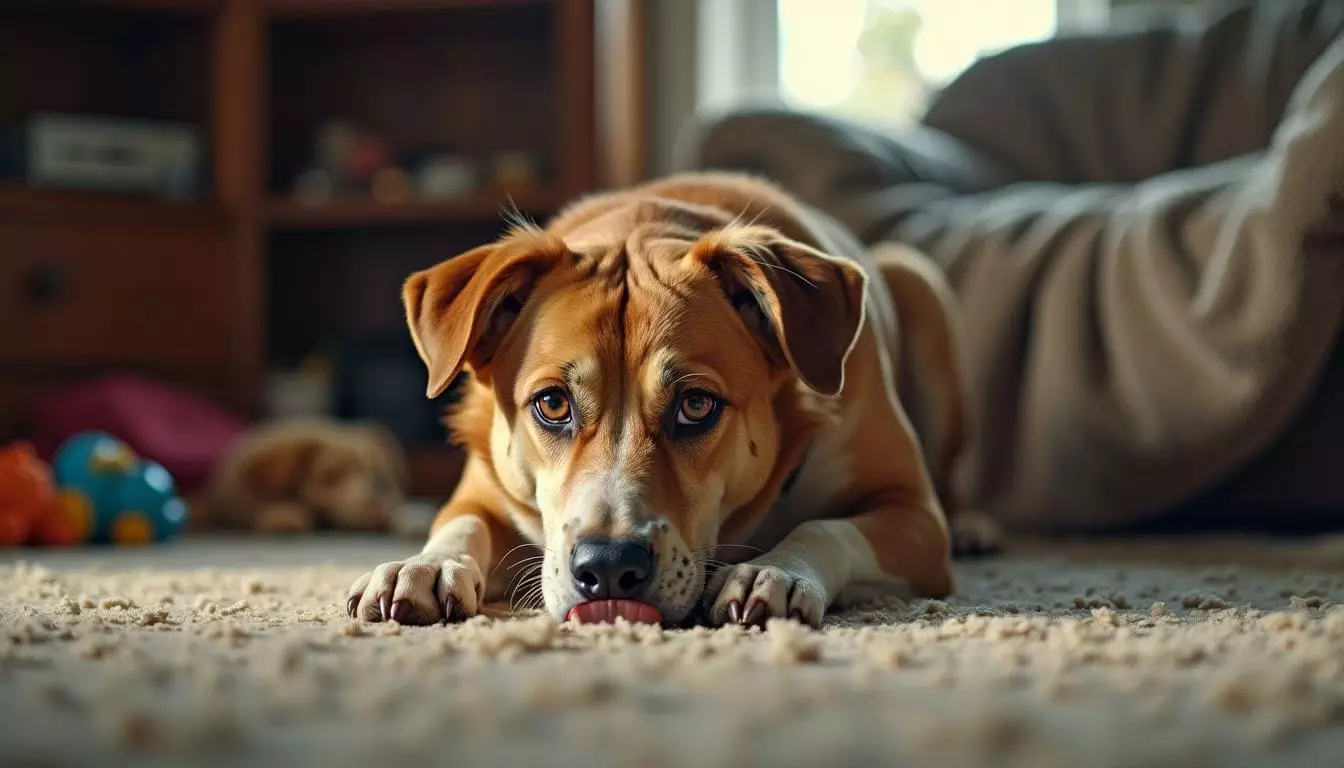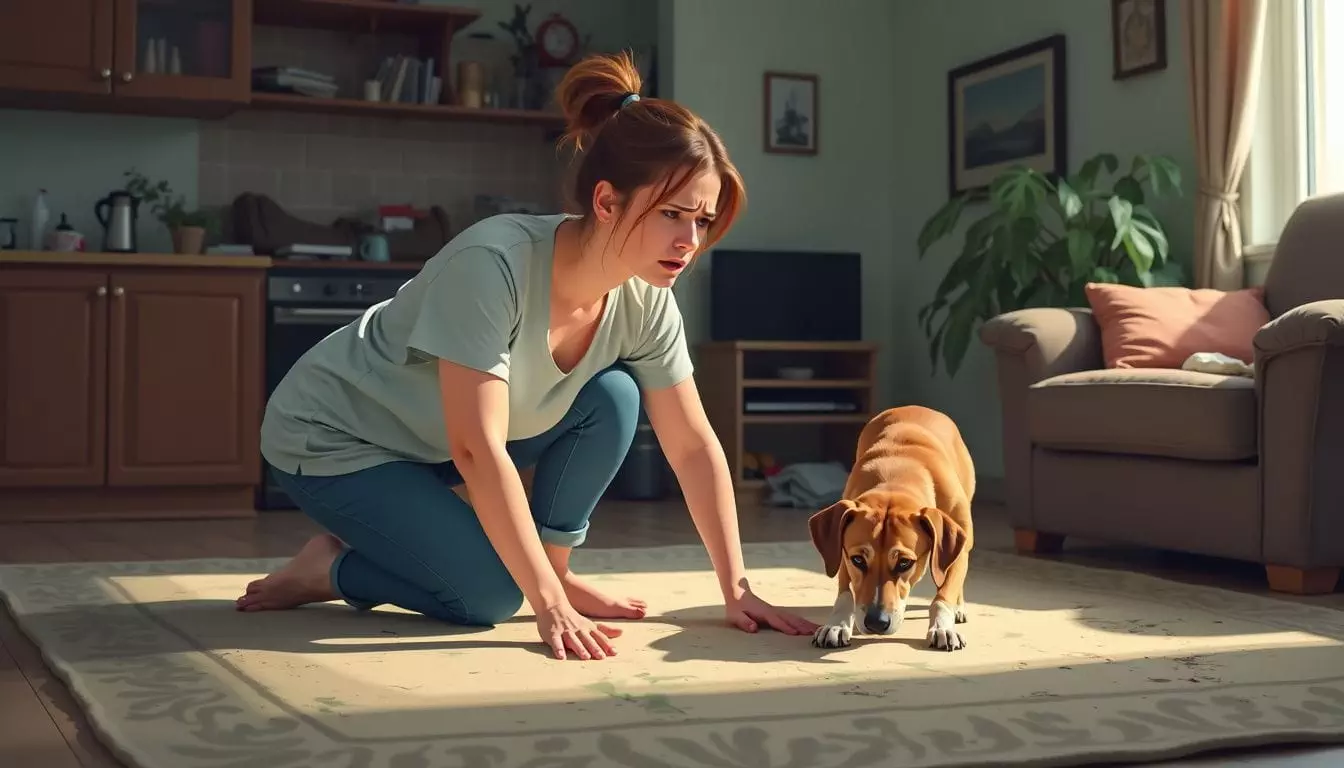Dogs licking carpets can puzzle and frustrate owners. This behavior often signals underlying health issues or environmental factors. Excessive carpet licking may indicate acid reflux, nausea, or even liver problems in dogs. 2 Our team of experienced veterinarians and certified dog trainers has seen countless cases of this perplexing behavior.
Understanding why dogs lick carpets is crucial for their well-being. It can stem from boredom, anxiety, or nutritional deficiencies. 1 Our experts have helped many pet owners address this issue effectively.
This article explores the reasons behind carpet licking and offers practical solutions to curb this habit.
Key Takeaways
- Dogs lick carpets due to boredom, stress, health issues, or seeking attention.
- Carpet licking may signal problems like acid reflux, nausea, or liver issues in dogs.
- Regular exercise, mental games, and vet check-ups can help stop this habit.
- Changes at home, new smells, or food bits on carpets can trigger licking.
- If home fixes don’t work, seek help from a vet or dog trainer.
Common Reasons for Carpet Licking in Dogs

Dogs often lick carpets for various reasons. These can range from simple boredom to more complex health issues.
Boredom
Dogs often lick carpets when they’re bored. This habit stems from a lack of mental and physical stimulation. Bored pups need more activities to keep their minds busy and bodies active. 1
A tired dog is a good dog, says Dr. Jane Smith, veterinarian.
Owners can fix this by adding more playtime and walks to their dog’s day. Puzzle toys and training sessions also help. These fun tasks give dogs something to do, cutting down on carpet licking. 2
Anxiety or Stress
Moving from boredom to deeper issues, anxiety and stress often trigger carpet licking in dogs. Pups feel uneasy due to changes at home, loud noises, or being left alone. This behavior helps them cope.
Licking releases feel-good chemicals in their brains, calming them down. Vets and trainers note that even with treatment, some dogs may not stop this habit fully. 3 Owners should watch for other signs like pacing, whining, or hiding.
These could point to bigger worries needing a vet’s help. Giving dogs a safe space, regular exercise, and mental games can ease their stress. 4 Patience and care go a long way in helping anxious pups feel better.
Nutritional Deficiencies
Dogs may lick carpets due to poor nutrition. Their bodies crave missing vitamins or minerals. This behavior often points to a lack of key nutrients in their diet. Carpet fibers might taste or smell like what they need. 1 But eating carpet can harm dogs. It may cause stomach issues or blockages. 2 Pet owners should check their dog’s food. A balanced diet stops this odd licking habit.
Seeking Attention
After addressing nutritional needs, it’s crucial to look at attention-seeking behaviors. Dogs often lick carpets to get their owners’ notice. This act can signal deeper issues. Carpet licking might mean a dog feels ignored or needs more interaction. 5
Pet parents should watch for this sign. It could point to serious health problems. Quick action is key. Owners must give their dogs proper care and time. This helps stop unwanted behaviors before they worsen. 2
Habitual Behavior
Dogs often lick carpets out of habit. This behavior starts small but grows over time. Pets may find comfort in the texture or taste of carpet fibers. Some dogs lick to self-soothe when stressed or bored.
The act releases feel-good chemicals in their brains, making it rewarding. 1 Owners might unknowingly encourage this habit by giving attention when it happens. Breaking this cycle takes patience and positive training methods.
Next, we’ll explore health-related causes of carpet licking in dogs. 2
Health-Related Causes
Dogs may lick carpets due to health issues. Pain, nausea, or allergies can trigger this behavior.
Nausea or Digestive Issues
Nausea often leads dogs to lick carpets. This behavior stems from an upset stomach or acid reflux. Dr. Ryan suggests Pepcid AC as a remedy. The dosage is one 10mg tablet per 20 to 40 pounds of body weight every 12 hours.
For persistent issues, a vet may recommend bloodwork. A bland diet of boiled chicken and rice can help soothe stomach troubles. 2
Digestive problems may cause excessive carpet licking. Dr. Sarah points to nausea as a common culprit. She advises giving 1/2 tablet of Pepcid, Zantac, or Tagamet every 8 hours. These meds can ease discomfort and reduce licking.
If symptoms persist, a trip to the vet is crucial. They’ll check for underlying health issues that might be triggering this odd behavior. 6
Pain or Discomfort
Dogs often lick to soothe pain. Arthritis or soft tissue injuries can cause discomfort, leading to carpet licking. 7 Nail problems also trigger this behavior. Long or cracked nails hurt, making dogs lick floors for relief.
Pets may focus on specific spots that hurt, like joints or paws. This licking can point to hidden health issues needing a vet’s care. 2
Allergies or Skin Conditions
Dogs can get allergies from carpet fibers. These allergies make their skin itchy and red. The pup may lick the carpet to soothe the itch. Carpet allergies happen when a dog’s immune system overreacts to proteins in the carpet.
Vets can treat this with medicine like antihistamines or steroids. Treatment costs about $400 on average. Some severe cases need special shots called immunotherapy. 8 Next, let’s look at how the home environment affects carpet licking. 7
Environmental Factors Contributing to Carpet Licking
Dogs may lick carpets due to their surroundings. Things like food bits, cleaning products, or new smells can spark this behavior.
Presence of Food Residues
Food bits on carpets tempt dogs. Crumbs, spills, and smells lure them to lick. A dog’s keen nose picks up tiny food traces humans miss. Tasty residues from meals or snacks stick to carpet fibers.
This creates an irresistible buffet for curious pups. Regular vacuuming helps remove these tempting morsels. But some scents may linger, keeping dogs interested. 1 Next, we’ll look at how household chemicals affect carpet licking. 2
Household Chemicals or Scents
Dogs often lick carpets due to household chemicals or scents. 1 Cleaning products, air fresheners, and spilled food can leave enticing odors. These smells may trigger a dog’s curiosity or appetite.
Some dogs even develop a taste for certain carpet fibers or treatments. This behavior poses risks. Ingesting chemicals from carpets can harm a dog’s health. 2 It may cause stomach upset, vomiting, or more serious issues.
Pet owners should store cleaning supplies safely and clean spills promptly. Using pet-safe products helps reduce these risks. Next, we’ll explore how changes in the home environment affect a dog’s licking behavior.
Changes in the Home Environment
Moving from chemicals to home changes, dogs often react to shifts in their surroundings. New furniture, remodeling, or relocating can upset a dog’s routine. These changes may lead to stress-induced behaviors like carpet licking. 1
Dogs thrive on familiarity. Bringing old toys or beds to a new home helps them adjust. Regular exercise and play time ease anxiety during transitions. Keeping meal and walk schedules consistent provides stability.
With patience and care, most dogs adapt to new environments within a few weeks. 2
Behavioral and Psychological Triggers
Dogs may lick carpets due to stress, boredom, or mental health issues. Read on to learn more about these triggers and how to address them.
Compulsive DisordersCompulsive disorders in dogs can lead to constant carpet licking. These disorders stem from anxiety, stress, or boredom. 9 Dogs may lick to self-soothe or cope with their feelings. 9 This behavior often becomes a habit, hard to break.
Vets and trainers see this issue often. They know it can harm a dog’s health if left unchecked. Licking releases feel-good chemicals in a dog’s brain. This makes the dog want to keep doing it.
Over time, this can create bald spots or sores on the skin. It’s key to address the root cause of the anxiety or stress to stop the licking. 2
Response to Changes in Routine
Dogs thrive on routine. Changes can upset them and lead to carpet licking. Moving homes, new family members, or schedule shifts can trigger this behavior. A dog may lick the carpet to self-soothe or cope with stress from these changes. 10
Experts suggest keeping some parts of a dog’s routine stable during big changes. Regular meal times, walks, and play sessions help. Gradual introductions to new situations also reduce stress.
Owners should watch for signs of anxiety and provide extra comfort during transitions. 2
Lack of Mental Stimulation
Mental boredom can lead to carpet licking in dogs. 2 Smart pups need brain games to stay happy. Puzzle toys and training sessions give their minds a workout. These activities prevent destructive behaviors like excessive licking.
Owners should provide daily mental challenges for their furry friends. 11
Regular exercise also helps curb boredom-related licking. Daily walks and playtime keep dogs physically and mentally fit. Interactive toys that dispense treats make dogs work for their food.
This engages their problem-solving skills and natural instincts. A tired, mentally satisfied dog is less likely to lick carpets out of boredom. 11
Similar Behaviors in Dogs: Why Does My Dog Lick Her Bed?
Dogs often lick their beds for comfort or to mark their territory. This behavior stems from instincts to create a safe, familiar space. Some pups lick their beds due to anxiety or boredom, similar to carpet licking. If the behavior becomes excessive, it could indicate underlying stress or even a medical issue, such as allergies or gastrointestinal discomfort. Understanding why dogs lick their bed can help pet owners address their dog’s needs more effectively. Providing mental stimulation, a consistent routine, and a cozy environment can reduce the urge to engage in this habit.
Experts note that excessive bed licking could signal health issues like allergies or digestive problems. Pet owners should watch for signs of distress or changes in licking patterns. 6
Bed licking shares roots with other dog behaviors like paw licking or tail chasing. These actions can release feel-good chemicals in a dog’s brain, making them habit-forming. To curb excessive licking, owners can provide more exercise, mental stimulation, and cozy alternatives like chew toys.
Regular vet check-ups help rule out underlying health concerns that might trigger this behavior. 2
Practical Steps to Reduce or Stop Carpet Licking
Dogs often lick carpets due to boredom or anxiety. Owners can take steps to stop this habit and improve their pet’s well-being.
Providing Adequate Physical Exercise
Physical exercise keeps dogs happy and healthy. A tired dog is less likely to lick carpets out of boredom. Daily walks, fetch games, and playtime burn energy. Aim for 30-60 minutes of activity per day, based on your dog’s age and breed.
“First, make sure your dog gets plenty of exercise. Get them off the floor and onto their paws. Take your pooch on a walk around the neighborhood …; Increased physical and mental stimulation through play, exercise, and training can help reduce carpet licking.; Consistent routines and environments contribute to the overall well-being of dogs.” 11
Active dogs need mental challenges too. Try puzzle toys or hide treats around the house. These games work their brains and bodies. Next, let’s look at how mental stimulation through games and training can help stop carpet licking. 2
Mental Stimulation Through Games and Training
Dogs need mental workouts. Puzzle games keep their minds sharp. Treat balls and Kongs filled with goodies give pups a fun challenge. These toys fight boredom and stop unwanted licking. 9 Training sessions also boost brain power. Teaching new tricks or practicing old ones keeps dogs engaged. A tired mind leads to a calm dog. Regular play and training sessions create a happy, well-behaved pet. 2
Regular Veterinary Check-ups
Mental games keep dogs busy. But health checks matter too. Regular vet visits help spot carpet licking causes early. Vets can find hidden health issues that make dogs lick. They check for things like allergies or stomach problems. 9
Owners should track their dog’s licking habits. Note when and how often it happens. This info helps vets figure out what’s wrong. Vets may do tests to rule out serious health problems.
They can also suggest ways to stop the licking at home. Quick action can solve issues before they get worse. 2Modifying the Home Environment
Dog owners can change their homes to stop carpet licking. They should clean floors often to remove food bits and smells. Using pet-safe cleaners helps avoid harmful chemicals. Moving furniture or adding new toys gives dogs fresh things to explore.
This cuts boredom that leads to licking. 11
A calm space helps stressed dogs relax. Soft music or pheromone diffusers create a soothing mood. Comfy beds in quiet spots offer safe zones. Blocking views of busy areas reduces outside triggers.
These steps make homes more dog-friendly and less lick-worthy. 2
When to Seek Professional Help
Sometimes a dog’s carpet licking needs expert help. A vet can spot health issues or a dog trainer can fix behavior problems.
Persistent or Intensifying Behavior
Dogs who keep licking carpets need help. This habit can point to health issues or stress. Vets say dogs may lick more if they feel pain or have stomach problems. 2 A dog that won’t stop licking might need a check-up.
Owners should watch for other odd behaviors too. These could be signs of bigger problems. 12
Experts suggest more exercise for bored dogs. 12 Training games can also help stop constant licking. But if a dog licks non-stop or seems upset, it’s time to call the vet. 2 Quick action can solve issues before they get worse.
Proper care keeps dogs happy and healthy.
Accompanied by Other Symptoms
Carpet licking paired with other signs needs quick action. A dog’s cough while licking could mean trouble. 6 Vets warn that foam vomit and non-stop coughing might point to serious issues like GDV.
This condition requires fast medical help. Pet owners must watch for these red flags. Spotting them early can save a dog’s life. Quick vet visits are key when new symptoms pop up with carpet licking.
Next, we’ll look at when to seek expert help for this behavior. 2
Lack of Response to Home Interventions
Home remedies may prove ineffective. Dogs might continue licking carpets despite alterations in diet, exercise, or surroundings. This behavior can indicate underlying issues. Continuous licking requires veterinary evaluation. 6 Veterinarians can identify concealed health problems or intricate behaviors. 6 A professional can develop a customized plan to permanently stop the licking.
The following section will discuss when to seek professional help for a dog’s carpet-licking habit. 2
Conclusion
Dogs lick carpets for many reasons. Boredom, stress, or health issues can cause this habit. Owners must watch for signs of illness or anxiety. Regular vet checks help rule out medical problems. In addition to monitoring for signs of illness or anxiety, it’s important for dog owners to engage their pets in regular physical and mental activities to alleviate boredom. If you find yourself wondering, “why is my dog licking the carpet,” it may be beneficial to keep a journal of their behavior to identify patterns or triggers. Consulting with a veterinarian or a pet behaviorist can provide valuable insights and strategies to address this unusual habit effectively.
With care and attention, most dogs can stop this behavior. Proper exercise, toys, and training often solve the issue.
For insights on related behaviors, check out our article on why dogs lick their beds.
FAQs
1. Why does my dog keep licking the carpet?
Dogs may lick carpets due to stress, boredom, or health issues. It could be a sign of stomach problems, anxiety, or nutrient deficiency. Sometimes, they’re just curious about new smells.
2. Is constant carpet licking normal for dogs?
No, it’s not normal. If your dog is obsessively licking the floor or carpet, it’s time to pay attention. This behavior might indicate underlying issues that need addressing.
3. How can I stop my dog from licking the carpet?
First, rule out medical causes with a vet visit. Then, try these:
– Provide more mental stimulation
– Use positive reinforcement training
– Clean the carpet to remove enticing smells
– Offer chew toys as a distraction
4. Could carpet licking be a sign of illness?
Yes, it could. Excessive licking might point to:
– Gastrointestinal issues
– Canine cognitive dysfunction in older dogs
– Adrenal gland problems
– Mouth or throat irritation
5. When should I take my dog to the vet for carpet licking?
See a vet if your dog:
– Licks obsessively or frantically
– Shows other symptoms like vomiting or diarrhea
– Suddenly starts this behavior
– Tries to eat the carpet
6. Can diet changes help stop carpet licking?
Sometimes. A balanced diet can reduce nutrient-seeking behaviors. But don’t change your dog’s food without consulting a vet first. They might suggest adding supplements or switching to a different type of food.
References
- ^ https://bestfriendsvet.org/blog/dog-licks-carpet/
- ^ https://www.justanswer.com/dog-health/g6tzv-dog-woke-profusely-licking-carpet.html
- ^ https://wagwalking.com/condition/excessive-licking (2017-06-15)
- ^ https://www.denverpost.com/2013/08/06/your-dogs-obsessive-licking-illness-or-anxiety/
- ^ https://www.justanswer.com/dog-health/7cyuq-dog-started-gulping-licking-floor-carpet.html
- ^ https://www.justanswer.com/dog-health/65o07-year-old-dog-licking-carpet-sounds.html (2012-01-26)
- ^ https://www.petmd.com/dog/general-health/excessive-licking-chewing-and-grooming-dogs (2021-09-27)
- ^ https://wagwalking.com/condition/carpet-allergies
- ^ https://www.dogster.com/dog-behavior/why-does-my-dog-lick-the-carpet
- ^ https://mypetnutritionist.com/post/why-does-my-dog-keep-licking/ (2021-01-11)
- ^ https://drmartypets.com/why-dog-licking-carpet/ (2018-01-19)
- ^ https://ask.metafilter.com/27803/Dog-constantly-licks-the-carpet (2005-11-23)

